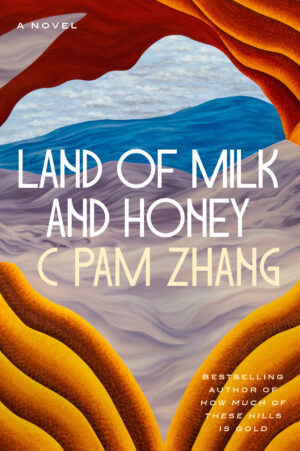Land of Milk and Honey
by C Pam Zhang
reviewed by Marisa Wright
C Pam Zhang’s latest novel, Land of Milk and Honey, is not a pandemic novel per se, but it did grow out of the pandemic. Unfolding in a near future where smog blankets the Earth, causing global famine and mass extinction, the narrative follows an unnamed twenty-something chef stranded in England, who escapes as its borders are closing to join a shadowy research community perched atop a mountain in the Italian Alps.
Exploring the complex interplay of food, pleasure, violence, and catastrophe, Land of Milk and Honey depicts a privileged oasis within a wasteland ravaged by environmental catastrophe, one that is dependent on the patronage of wealthy investors and state involvement. The chef’s “employer,” a sinister, reclusive capitalist, is engaged in de-extinction projects, cultivating animals and seeds in underground laboratories to ensure a future beyond Earth’s impending doom.
The narrator’s ostensible role—to create lavish meals for affluent residents of the community and potential investors—is gradually revealed to be more about her ethnicity than her culinary skills. Shortly after arriving on the mountain, the chef is contracted to impersonate Eun-Young, the employer’s departed wife, who was a key figure in the secret survival project. At the same time, she becomes sexually and emotionally intertwined with Aida, the employer’s domineering daughter, a scientific researcher who has made it her life’s mission to provide the requisite genetic engineering for the repopulation project. Ethical conflicts arise as the lines between power and responsibility blur.
With Land of Milk and Honey, Zhang raises questions about morality, survival, and the consequences of knowing complicity. It’s tempting to call the novel dystopian, but that characterization implies something distant or improbable about the future Zhang depicts. The world described in Land of Milk and Honey is hauntingly familiar—one that could arrive tomorrow. As in her debut novel, How Much of These Hills is Gold, a Booker Prize nominee and finalist for the PEN/Hemingway Award, Zhang achieves an arresting, inventive conceit. Through it, she deftly diagnoses societal ills, drawing attention to both the absurdities and calamities staring us right in the face.
At many points in the book, Zhang’s prose soars, the vivid imagery creating a luscious sensory experience. The first chapter opens: “I fled to that country because I would have gone anywhere, done anything, for one last taste of green sharp enough to pierce the caul of my life. I was twenty-nine, a hungry ghost, adrift. I hadn’t seen California in ten years, hadn’t tasted a strawberry or a leaf of lettuce in three. Hunger was simple, as the rest was not.”
At other points, though, the execution falls flat. The descriptions of food read like something spit out by a large language model (“Terrines. Perfect roast chickens. Frisée aux lardons topped with the orange yolk of the country’s eggs”). The sex scenes sometimes read like a parody of the infamously poor way white male writers have tended to write about women and intimacy. (“I looked to Aida for the salt. Sweaty, unshowered, her pubis its own rough ocean. Saline, the meat of her as she bucked against my tongue, split open, gleaming.”) Whole paragraphs are weighed down with flowery prose that overwhelms the narrative and disorients the reader.
These missteps do not, however, significantly detract from the real value of the book: its ideas. Zhang has insight into several subtler themes, from the brutality of the United States immigration system to the simultaneous invisibility and hyper-sexualization of Asian women. All the while, the chef’s year-long journey unfolds against a backdrop of societal collapse, decadence, and a fight for survival. Despite the challenges they face, Zhang’s characters insist on moral complexity in the face of society’s disintegration, leaving the reader to contemplate the questions raised by our own calamitous times.
Land of Milk and Honey serves as a prescient warning of impending catastrophe brought about by capitalism run amok. The juxtaposition of culinary overindulgence with a world on the brink of collapse resonates with contemporary concerns about environmental destruction and social inequality, calling to mind recent books like Birnam Wood and films like The Menu. As her chef-narrator navigates a not-so-far-off reality, Zhang’s novel reads as a poignant reflection on the consequences of inaction on our collective and individual life.
Published on June 7, 2024

